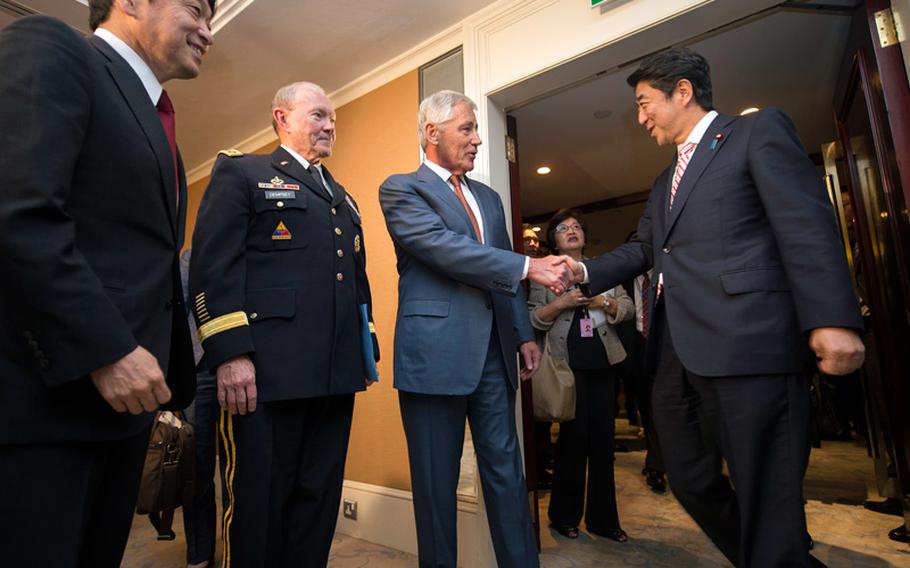Asia-Pacific
Hagel chastises China, says US to increase Asia military exercises
Stars and Stripes May 31, 2014

Defense Secretary Chuck Hagel, center, and Army Gen. Martin E. Dempsey, left, chairman of the Joint Chiefs of Staff, greet Japanese Prime Minister Shinzo Abe at the Shangri-La Hotel in Singapore, on Friday, May 30, 2014. (Aaron Hostutler/U.S. Marine Corps/DOD)
SINGAPORE — Secretary of Defense Chuck Hagel accused China of destabilizing the Asia-Pacific region through provocative actions against its neighbors in a wide-ranging speech at the Shangri-La Dialogue on Saturday.
Hagel also sought to reassure allies who have questioned the efficacy of the Obama administration's rebalance of military and diplomatic attention to the Asia-Pacific, with guarantees that U.S. activity would increase and that U.S. defense cuts would not come out of the region.
"All nations in the region, including China, have a choice: to unite and recommit to a stable regional order, or to walk away from that commitment and risk the peace and security that has benefited millions of people around the Pacific," Hagel said.
He planned to meet later in the day with Vietnamese Defense Minister Phung Quang Thanh, whose nation is struggling with a fleet standoff in the South China Sea over a $1 billion Chinese oil rig deployed near islands that both Vietnam and China claim.
Hagel and other U.S. officials have largely blamed China for provoking the standoff, which resulted in a Vietnamese fishing boat sinking recently.
Vietnam claimed the ship was rammed, while China said it collided with a Chinese ship and capsized.
Hagel also told the more than 1,000 attendees that the U.S. military would increase its exercises in the region to 130 and its port visits to 700 annually.
Additionally, the U.S. plans to increase foreign military financing in the region by 35 percent and military training and education by 40 percent by 2016, Hagel said.
"Both President Obama and I remain committed to ensure that any reductions in U.S. defense spending do not come at the expense of America's commitment to the Asia-Pacific."
The region will continue to receive some of the military's best aircraft and ships, including the new Zumwalt-class destroyer, by 2018, Hagel said.
Nevertheless, lawmakers and analysts continue to question whether the congressionally mandated budget caps known as sequestration will impact overall military readiness.
Hagel met with officials from Australia and Japan yesterday to review trilateral security assistance in the region and said he would meet jointly with Japanese and South Korean officials today.
The United States is considering fielding an advanced missile defense platform in South Korea and wants trilateral cooperation on missile defense, U.S. officials said.
However, Japan-South Korea relations have worsened in recent years, following tensions over the disputed island territory known to Korea as Dokdo and Japan as Takeshima. Relations further worsened after statements by Japanese government officials indicated to many South Koreans that Japan was not sufficiently remorseful for its colonization of Korea and its conduct during WWII.
slavin.erik@stripes.com Twitter: @eslavin_stripes